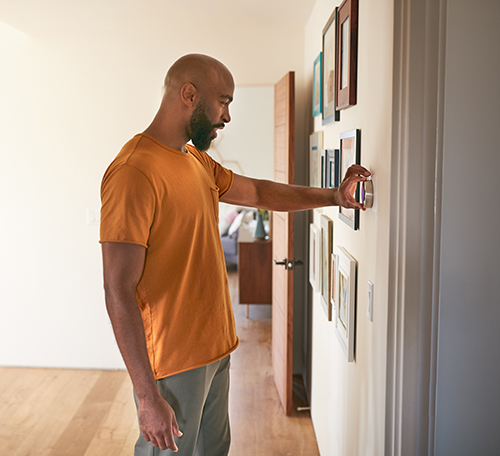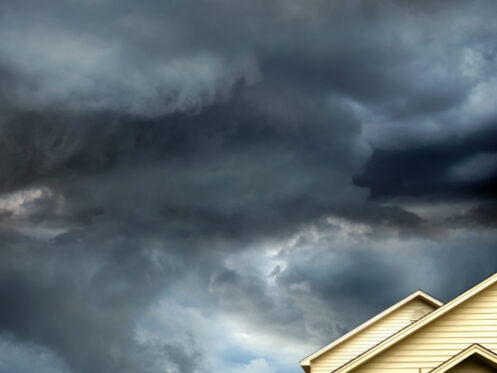Have you ever looked out at pouring rain and wondered how it’s impacting your home’s system? Plenty of people assume that extreme weather can reduce their HVAC unit’s efficiency or even damage the system. However, the reality is a little more nuanced. Though your HVAC system is surprisingly sturdy, rain can affect it in some surprising ways. Here are the important details you need to know about rain and your HVAC.
Rain Typically Won’t Harm Your Outdoor Unit
Most people are used to having delicate, indoor electronics that can get damaged when wet, so it’s understandable to be concerned when you see your outdoor HVAC unit sitting in the rain. However, it’s important to keep in mind that they are actually designed for this. The outdoor unit, which contains your compressor and condenser, is meant to sit outside where it can vent off heat away from your home. Manufacturers know these units will be exposed to the elements for years, so they make them extremely waterproof.
The design of your condenser unit involves sealing all electrical components safely away inside the system. This ensures all delicate parts of the outside unit are completely watertight. The parts of the unit that are exposed to the rain are made with very sturdy, corrosion-resistant materials. Depending on your system, this might include aluminum, copper, or specialized plastics. Not only can your system stand up to the occasional sprinkle, but even heavy downpours can’t keep it from running.
Usually, the only time you need to be concerned about your HVAC unit is if it’s damaged. Things like tree limbs blowing around in the wind can hit your system and potentially crack open the waterproof housing. This is quite rare, but if it happens, water can hurt your system. To reduce the risk of this happening, it is a good idea to get your HVAC system routinely maintained. The technician can catch any damage and recommend ways to repair it.
Flooding Can Damage Your HVAC System
The typical downpour, no matter how heavy, won’t harm your HVAC unit. However, it is still a good idea to check up on it during particularly extreme weather. Look to see whether or not your condenser is standing in water. Typically, the concrete pad that your unit is on will keep it out of any puddles. However, if your property is sloped or if you experience flooding, you can have some problems. Your condenser’s design repels water dripping down, but if it’s submerged in water, some parts might get damaged.
Fortunately, there are some things you can do to reduce the chance of a flood-damaged HVAC system. Turning off power at both the breaker panel and the thermostat is a good start. This gives your system a chance to dry out without facing any more damage. Avoid running it until you call out a heating technician or a cooling technician to inspect your system. They can identify corroded wires or other flood damage that could make your unit break.
Skip Covering Your Condenser Unit With a Tarp
Some homeowners get a little nervous about rain and consider covering their HVAC systems to give themselves a little piece of mind. Though this might seem harmless, it’s a bad idea. A tarp traps air and moisture around your HVAC system. Not only does this keep your equipment from drying out between rainfalls, but it also keeps it from transferring heat as efficiently.
To keep your HVAC system running in optimal condition, make sure that you have the manufacturer’s recommended amount of clearance around it. If you’re still worried about rain damage, you are better off consulting with an HVAC technician. They can help find safe alternatives like mounting your unit on a higher level to keep it out of puddles.
Consult an expert with HVAC Tech Today
Rain Can Actually Improve Your HVAC Efficiency
Another common concern people have is that rain will make their system run less efficiently. The outdoor condenser unit of an AC system releases heat into the air, while the outdoor part of a heat pump can collect or dispel heat into the air. While it’s understandable to be concerned that humidity might affect this process, the reality is that rain can actually be good for your HVAC efficiency.
First of all, rain helps make your AC more efficient because it lowers the temperature. On a hot, summer day, a refreshing rain shower can give your AC a little bit of a break. The other way that rain helps is by cleaning your unit. As rain drips over your condenser, it removes small bits of dust and debris that were sitting on the system. This natural cleaning can help your system transfer heat a little more efficiently after it rains.
You Might Need to Adjust Your Thermostat to Counteract Humidity
Fortunately, this problem is very easy to solve. A slight adjustment to your thermostat can help remove excess moisture from the air. All you need to do is change the temperature until your HVAC system switches on. In addition to heating and cooling the home, HVAC systems also dehumidify your house. The longer it runs, the more humidity it will remove. Most homeowners find that this is adequate to adjust humidity levels, but some find that it makes their home a little hotter or cooler than they prefer. If your HVAC system alone can’t comfortably handle all the humidity in your home, it can be helpful to also get a dehumidifier installed.

Rain Might Cause Your Technician to Reschedule
One more important thing to know about rain is that it might impact any scheduled service appointments you have. If your service technician needs to do anything with your condenser unit, they might need to wait until the rain stops before they can repair or maintain your system.
The most important reason they will need to wait is that working with electrical parts in the rain is dangerous. Water can conduct electricity very easily, so there is a greater risk of an HVAC technician getting injured. Furthermore, it can also harm your HVAC unit. Having to open it can let water drip inside to the parts of the system that are never supposed to get wet. Therefore, technicians usually will not work on an HVAC system in the rain unless it’s an emergency situation and appropriate precautions have been taken.
Have any other questions about how your HVAC system works? The team at F.F. Hitchcock Plumbing, Heating & Cooling is happy to answer your questions. We can assist you with learning about your system and finding the most effective ways to run it. We also provide Cheshire residents with a broad range of other repair, installation, and maintenance services. To learn more about our HVAC, plumbing, and fuel services, contact F.F. Hitchcock Plumbing, Heating & Cooling today.







